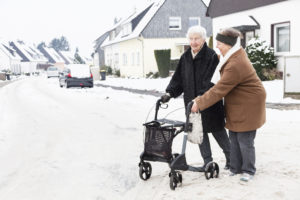Fall has arrived and winter is just around the corner. It’s not too early to start planning ahead for the cold weather, so you can ensure you’re able to continue living safely and comfortably throughout the winter months.
The first concern is hypothermia, a condition when the body’s temperature drops below normal and stays that way for a prolonged period of time. Older adults are often more susceptible to hypothermia, as the body’s response to cold may be diminished by certain aspects of aging, such as illnesses like diabetes, medications, and a general lack of physical activity.
The National Institute on Aging provides these tips to help you prevent hypothermia:
- Wear several layers of loose clothing when it is cold. The layers will trap warm air between them.
- Wear a hat, scarf, gloves or mittens, and warm clothes when you go outside. A significant amount of your body heat can be lost through your head, and hands and feet are the first body parts to get cold.
- To keep warm at home, wear long underwear under your clothes, along with socks and slippers.
- Make sure your home is warm enough. Set your thermostat to at least 68 to 70 degrees.
- Check with your doctor to see if any medications you are taking may increase your risk for hypothermia.
Here are some other tips to help you stay safe and warm this winter:
Be careful when walking in ice and snow
Winter weather can increase your risk of falling. To reduce your risk, be conscious of where you’re stepping, wear the right footwear (boots with textured soles are best), and use handrails wherever possible.
Stay as physically active as possible
While cold weather may keep you indoors, don’t let that be an excuse for not getting enough exercise. Physical activity is essential for keeping a healthy body and can reduce your risk of falling. Check out your local senior center for exercise classes, call up a friend to go bowling, take a tai chi or yoga class at your local community center, or pop in an exercise DVD in the comfort of your home.
Winterize your home
Make sure your furnace is in good working order and get a checkup from your emergency company. Dirty filters can restrict airflow and cause problems. Seal up any window and door gaps with caulking, weather stripping, or even a handmade “draft snake” – which can be as simple as sticking a rolled-up towel under a drafty door. Insulate your pipes to keep them from freezing. And finally, make sure you’ve stocked up on plenty of food in case a blizzard keeps you homebound for several days.
Take precautions if you travel
Listen for radio or TV reports of travel advisories issued by the National Weather Service. Avoid driving in low visibility and on ice-covered roads. If you must travel in ice or snow, let someone know your destination and when you expect to arrive. Bring a mobile phone with you.
Don’t isolate yourself
Finally, don’t let the cold weather keep you from spending time with friends and family. Isolation can lead to depression. According to World Health Organization experts, depression is the leading cause of poor health and disability worldwide. So make socializing a priority. Make a date with a friend to see a movie or play. If you have challenges finding someone to spend time with, engage the services of one of our cultured companions. If you’re unable to get out because of a health condition, invite people over for coffee or tea.


